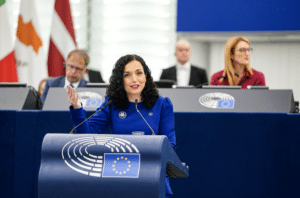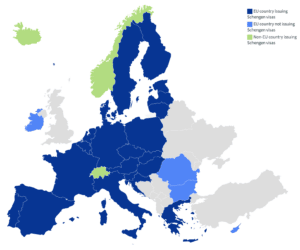Brussels – A new journey begins for the citizens of Kosovo, finally without restrictions. Since Jan. 1, with the entry into force of the visa-free regime, the last European country (except Russia and Belarus after the invasion of Ukraine) has also seen its Schengen borders open with only the use of a national passport. What for EU citizens is now a way of traveling that is almost taken for granted, now also applies to Kosovo, thanks to the political success of the European institutions last year.

“Our citizens now have the opportunity to visit family or pursue educational, cultural, and business opportunities just a short flight away: one step out of isolation, one step closer to the European Union,” said Prime Minister Albin Kurti on X, who on Jan. 1 greeted his fellow citizens departing on the first Pristina-Vienna ‘visa-free’ flight. Words that President Vjosa Osmani confirmed: “This historic milestone is not an achievement only for Kosovo, but an important step forward towards our shared goal: a closer, stronger and more united Europe.” The Kosovo leaders also wanted to recall what “conditions the visa-free regime imposes,” namely the ability to travel and stay freely in the EU and Schengen countries but no more than 90 days in a total period of 180 in the absence of a work or study permit. “We get more rights by responsibly exercising those that we have earned,” Premier Kurti stressed.
There is also great satisfaction in Brussels, particularly from the dossier’s rapporteur for the European Parliament in negotiations with the EU Council co-legislators, Thijs Reuten: “At last! After years of utterly unnecessary delays, as of today, visa-free travel for all citizens of Kosovo is effective,” he said at the entry into force of the agreed visa liberalization in 2023. The same Dutch MEP – who granted Eunews an interview when the plenary session gave the green light – underlined that the next step must be “processing the application for candidate status, Kosovo is Europe,” referring to Pristina’s application to join the European Union, officially presented on December 15, 2022. However, the dossier has stalled in the Council, where five members still do not recognize Kosovo’s sovereignty (Cyprus, Greece, Romania, Spain, and Slovakia) and are hindering the work of the 27 Member States. Speaking of stalemates, Spain is the only EU country that has decided not to recognize Kosovo‘s national passports, effectively disregarding the EU institutions’ decision to allow free travel across the continent for Kosovo citizens from January 1.
Beyond Kosovo, the other visa-free regimes
Decisions on visa liberalization for Kosovo updated the two lists attached to the 2018 Regulation: that of third countries whose nationals must be in possession of visas when crossing external borders and those whose nationals are exempt from this requirement. The first list includes all states in the world with which visa liberalization agreements are not in force, both those for which visas are always required to enter or transit any Schengen country (Afghanistan, Bangladesh, Eritrea, Ethiopia, Ghana, Iran, Iraq, Nigeria, Pakistan, Democratic Republic of Congo, and Somalia) and those for which visas are not required in all Schengen countries. Citizens of states on this list must comply with the national visa rules required by each EU or Schengen member. 
The second list contains 64 members, including two special administrative regions of China (Hong Kong and Macau) and Taiwan (a territorial authority not recognized as a state by all EU members). Agreements with Belarus, Russia, and Vanuatu have been suspended. For these non-EU and non-Schengen countries – like Kosovo – there is an exemption from having to apply for entry visas to enter the Schengen area, i.e., the area that has abolished internal borders. Nationals of these states can use their national passports – with no additional requirements – to travel and stay for up to 90 days (in a period of 180 days) in EU and Schengen countries.
All citizens of EU member countries can freely cross internal borders with their ID cards – even those outside the Schengen area, namely Cyprus, Bulgaria, Ireland, and Romania – as well as citizens of the external territories belonging to the 27 Schengen countries (Greenland, Svalbard Islands, French Guiana, New Caledonia, and other overseas territories). Also joining the area that abolished internal borders are four non-EU states: Iceland, Liechtenstein, Norway, and Switzerland. Nationals of any other country usually have to apply for a visa (work, tourist, or study), which is the act by which a state grants a foreign individual permission to enter its territory. However, the EU has established a common visa policy for short stays, transit through the territory, or in international airports of Schengen states.
Based on a case-by-case assessment, the Commission may propose a decision for visa liberalization to the co-legislators of the EU Parliament and Council. The assessment is based on pre-established criteria: irregular migration, public order and security, economic benefits (tourism and foreign trade), human rights, fundamental freedoms, regional coherence implications, and reciprocity. New exemption decisions must be adopted by both co-legislators, after bilateral negotiations with the country concerned.
English version by the Translation Service of Withub





